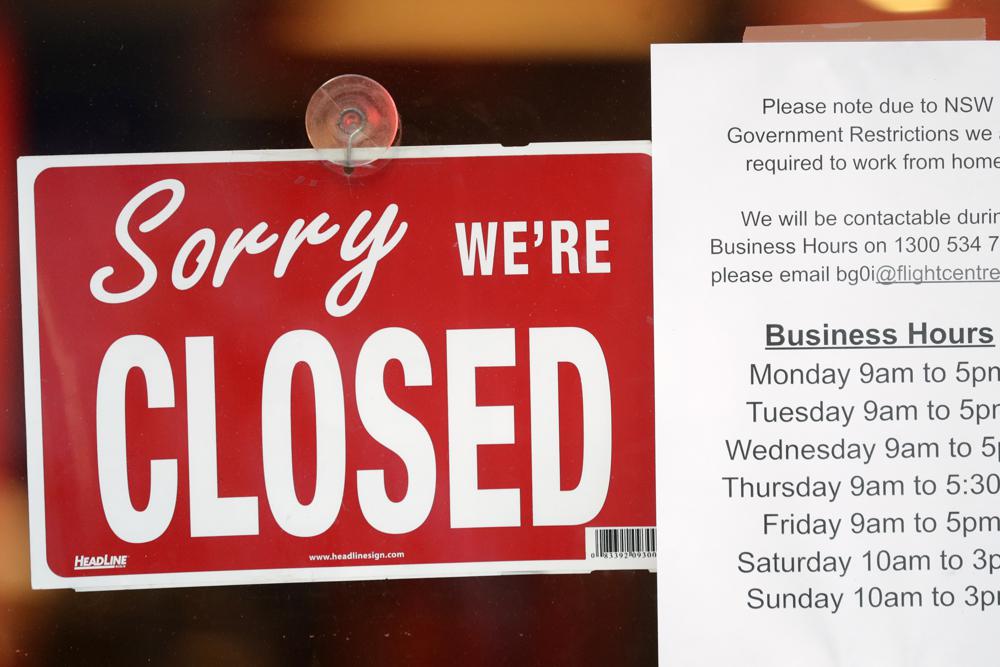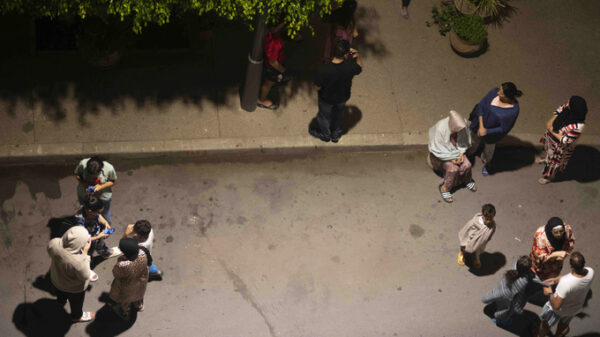A commercial business is closed in Sydney on Aug. 13, 2021, as greater Sydney continues a weeks-long COVID-19 lockdown. Japan, Australia and New Zealand all got through the first year of the coronavirus pandemic in relatively good shape, but now are taking very divergent paths in dealing with new outbreaks of the fast-spreading delta variant. (AP Photo/Rick Rycroft)
WELLINGTON, New Zealand (AP) — Cheryl Simpson was supposed to be celebrating her 60th birthday over lunch with friends but instead found herself confined to her Auckland home.
The discovery of a single local COVID-19 case in New Zealand was enough for the government to put the entire country into strict lockdown this past week. While others might see that as draconian, New Zealanders generally support such measures because they worked so well in the past.
“I’m happy to go into lockdown, even though I don’t like it,” said Simpson, owner of a day care center for dogs that is now closed because of the precautions. She said she wants the country to crush the latest outbreak: “I’d like to knock the bloody thing on the head.”
Elsewhere around the Pacific, though, Japan is resisting such measures in the face of a record-breaking surge, instead emphasizing its accelerating vaccine program. And Australia has fallen somewhere in the middle.
All three countries got through the first year of the pandemic in relatively good shape but are now taking diverging paths in dealing with outbreaks of the delta variant, the highly contagious form that has contributed to a growing sense that the coronavirus cannot be stamped out, just managed.
Professor Michael Baker, an epidemiologist at New Zealand’s University of Otago, said countries around the world are struggling to adapt to the latest threat: “With the delta variant, the old rules just don’t work.”
The differing emphasis on lockdowns versus vaccines — and how effective such strategies prove to be in beating back the delta variant — could have far-reaching consequences for the three countries’ economies and the health of their citizens.
Japan has never imposed lockdowns against the coronavirus. The public is wary of government overreach after the country’s fascist period before and during World War II, and Japan’s postwar constitution lays out strict protections for civil liberties.
Before the delta variant, the country managed to keep a lid on coronavirus outbreaks in part because many people in Japan were already used to wearing surgical masks for protection from spring allergies or when they caught colds.
Now, almost everyone on public transportation wears a mask during commuting hours. But late at night, people tend to uncover in restaurants and bars, which has allowed the variant to spread. Hosting the Tokyo Olympic Games didn’t help either.
While strict protocols kept infections inside the games to a minimum, experts such as Dr. Shigeru Omi, a key medical adviser to the government, say the Olympics created a festive air that led people in Japan to lower their guard.
New cases in Japan have this month leaped to 25,000 each day, more than triple the highest previous peak. Omi considers that a disaster.
Copyright 2021 Associated Press. All rights reserved.
Source: https://apnews.com/article/health-coronavirus-pandemic-b85fc82e35f50fbe0bb8283f45a30de0









































